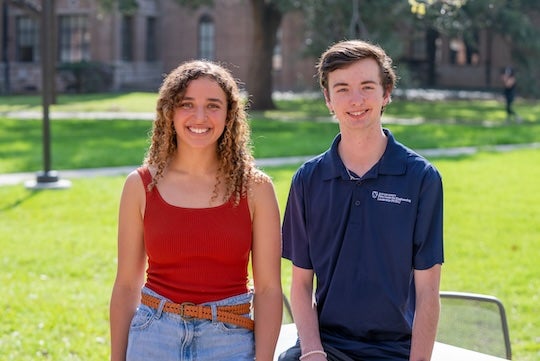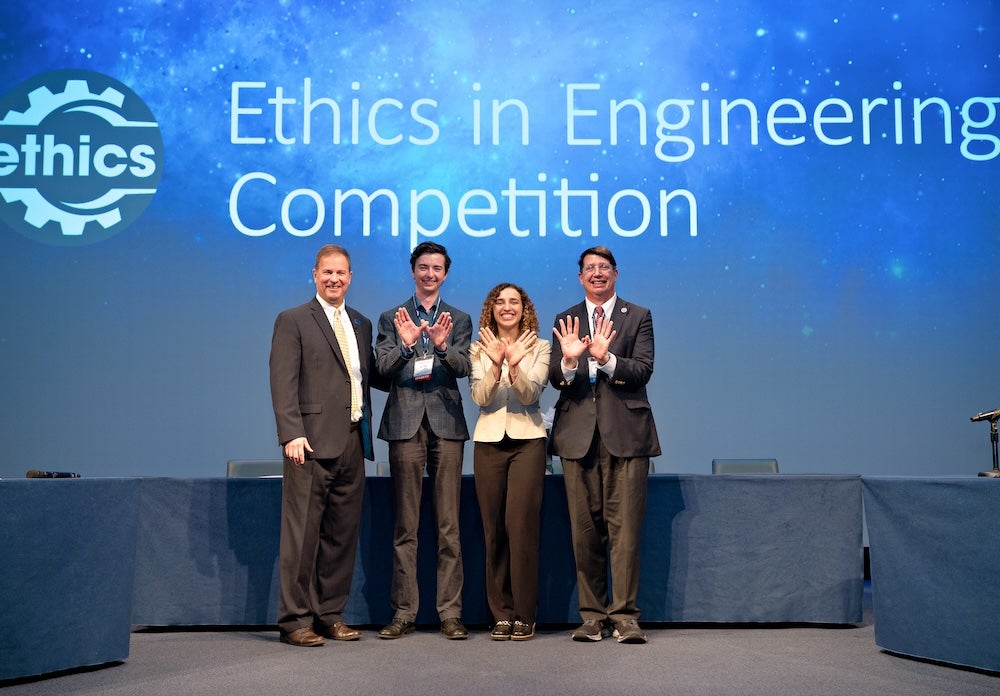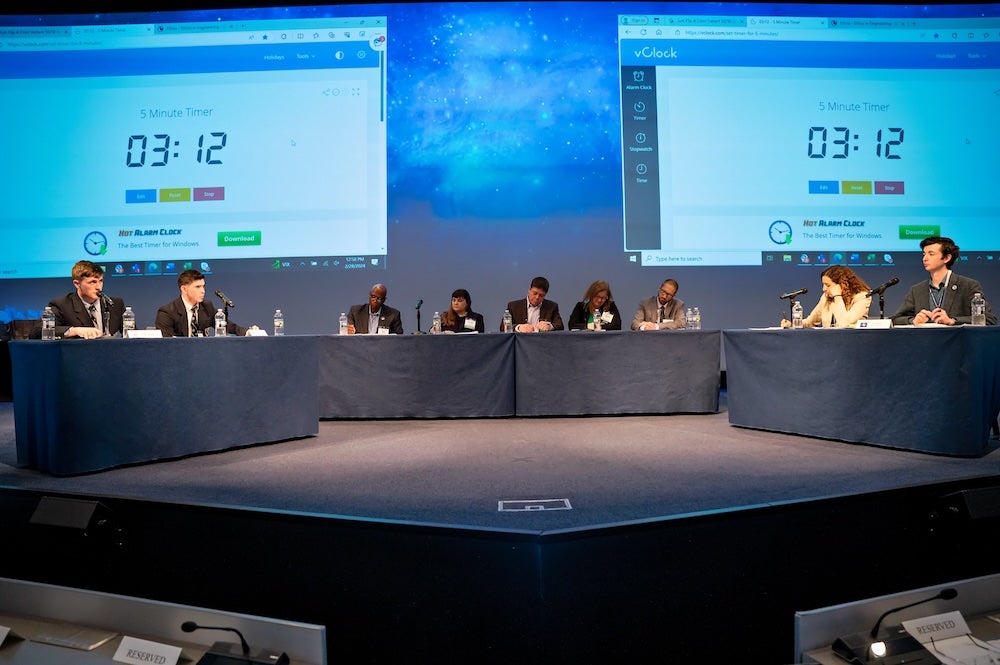Rice Team Wins Top Prize in 2024 Ethics in Engineering Case Competition
A team of Rice University engineering students has won this year’s national Ethics in Engineering Case Competition hosted by Lockheed Martin Corporation at their headquarters in Bethesda, Maryland. The competition saw 75 teams from 67 universities across the country competing in a rigorous tournament-style challenge that tested the students’ technical knowledge as well as their communication and ethics acumen.

Rice’s Cassandra Wagoner, a senior majoring in mechanical engineering, and Eric Breyer, a junior pursuing a major in computer science, navigated a complex hypothetical scenario involving contracts for hardware and software components of a satellite system tasked with tracking potentially hazardous asteroids. Mentored by faculty advisors George Webb and David Van Kleeck from the Rice Center for Engineering Leadership (RCEL), the team had roughly five weeks to develop an expertise in orbital mechanics, infrared imaging, machine learning and federal contracting.
In the competition scenario, NASA’s ground-based asteroid detection system observes a suspicious object of indeterminate size and orbit. In response, NASA hires a commercial satellite company to quantify the risk of impact, which in turn enlists two subcontractors ⎯ one specializing in infrared imaging systems and one specializing in artificial intelligence (AI) and tracking algorithms.
“We were role playing these two companies,” Wagoner said. “For each round, there was a coin flip to determine which subcontractor we’d be representing during a tense business meeting.”
The teams had to engage in complex impromptu negotiations involving questions of data integrity, potential breach of contract and authority issues. As is often the case with ethical dilemmas, the scenario did not entail a single, clear-cut solution, and the contractual puzzles the competitors had to unravel left a wide margin of possible solutions, testing their listening skills, persuasiveness, tact and ability to respond to emerging challenges.
“I think that was definitely hard ⎯ thinking on our feet,” Wagoner said. “Being willing to listen to other people and trying to figure out a way to put those solutions together and find the best way forward in a given timeframe ⎯ that was an important part of the challenge,” Wagoner added, stressing the importance of focusing on collaboration and securing consensus during negotiations.
Breyer, too, found the back-and-forth, face-to-face interaction to be one of the competition’s most challenging aspects.
“It was very unfamiliar to me, because I’ve never done any type of speech, debate or improv training,” Breyer said. “I got so much better at communicating my thought process and concisely getting my ideas across throughout the competition, and that’s going to serve me well in the future.”
For both students, one of the main takeaways from the competition scenario was the fact that unethical behavior does not necessarily entail a bad faith actor but often results from individuals’ struggle to meet competing demands or manage constraints in a given situation.
“Oftentimes when people act unethically, it’s because of some sort of constraint, whether it be cost, time or reputation,” Wagoner said. “People might end up doing things that they wouldn’t normally do because of the types of pressures they are under. So the important thing is to recognize that, especially under pressure, you have to step back and make sure you act in a way that is aligned with your values.”

In addition to mentorship from faculty, industry experts and peers, both Breyer and Wagoner credited their success in the competition to the communications and critical thinking skills they cultivated through the RCEL, whose Certificate in Engineering Leadership is the only one of its kind in the state and one of only a few in the nation.
“RCEL offers a sequence of classes that teaches us self-awareness, how to interact with other people and how to lead teams. We talk about ethics in almost every class,” Breyer said.
Wagoner said that “one of the reasons why we ended up doing as well as we did was our focus on soft skills.”
“A lot of the other teams really excelled in their technical solutions but were maybe not as focused on the communication aspect and on stepping back and asking, okay, if we can’t reach a certain benchmark, how are we going to mitigate the risks etc.,” explained Wagoner. “This goes to show just how important communication and critical thinking are, especially when you have these types of constraints and interactions between people who are in asymmetrical positions of power.”
RCEL offers resources and coursework for improving professional communication, engineering leadership and project management skills not usually covered in a traditional engineering curriculum. In so doing, RCEL fills a gap in engineering education highlighted most recently by the ethical questions brought up by the rise of AI and social media technologies.
“I think what makes engineering different is that we are, by definition, doing things that have never been done before,” Breyer said, highlighting the unique nature of the ethical challenges that engineering leaders and professionals are likely to face in their careers. “In school, you can often find yourself working in a vacuum ⎯ it can be just you, your project, your problem,” he added, pointing to how this lack of context can lead students to ignore the ethical and social impacts of their work, which may leave them unprepared for the complexity of real-world challenges.
 Even before the case problem was released, Breyer and Wagoner trained with last year’s team members, seniors Katie Hart and Jackson Hughes.
Even before the case problem was released, Breyer and Wagoner trained with last year’s team members, seniors Katie Hart and Jackson Hughes.
“They were absolutely selfless in helping this year’s team prepare,” said Webb, RCEL adjunct lecturer and industry relations director. “It was a great advantage to have Katie and Jackson still here at Rice generously volunteering their time getting involved in brainstorming sessions and mock rounds.”
Webb also helped the team prepare by identifying industry experts working in areas relevant to the case problem and enlisting their assistance in getting Breyer and Wagoner up to speed on the technical aspects of the case problem. Among some of the Rice faculty and alumni who provided invaluable support in helping the team prepare are Mickey Stevenson, assistant vice president for research integrity; Patrick Rodi, professor in the practice, mechanical engineering; Kevin Kelly, associate professor of electrical and computer engineering; Adam Baker, ISS systems manager at the NASA Johnson Space Center; Quyen Jones, Orion Loads and dynamics system manager at the NASA Johnson Space Center; and Nancy Chabot, planetary scientist in the Johns Hopkins University Applied Physics Laboratory.
“Our team was able to basically get an intellectual download from these really brilliant people in their areas, and that was tremendously valuable,” Webb said. “Cassandra and Eric defeated seven schools en route to the championship. I am proud to say that as they advanced, more and more of the other teams seemed to be pulling for Rice ⎯ a testament to the enthusiasm, friendliness and grace with which Cassandra and Eric represented Rice Engineering.”

